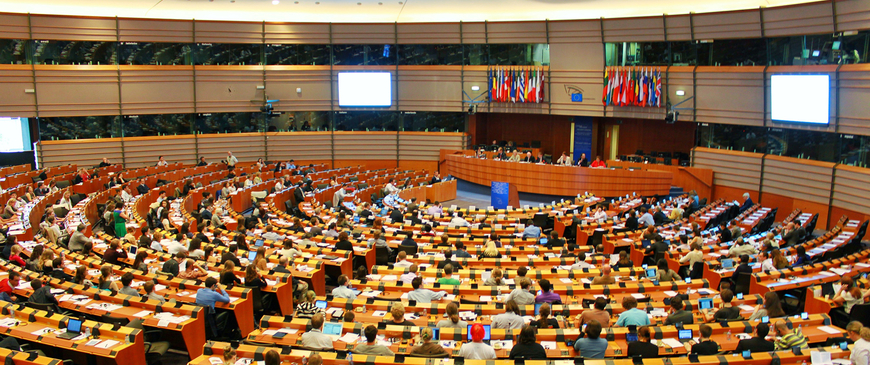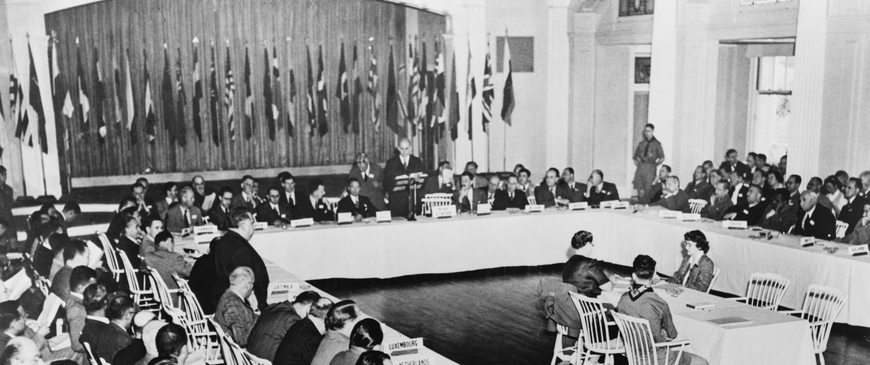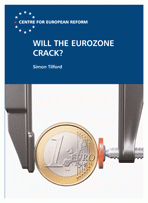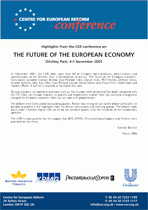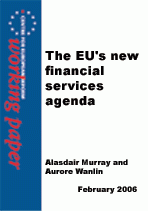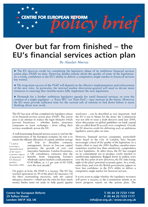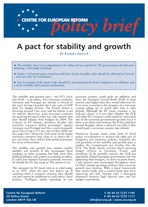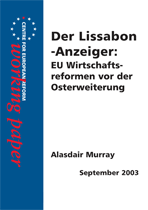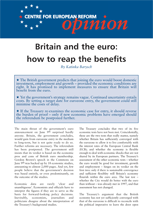Macroeconomics & the euro
Issue 56 - 2007
28 September 2007
- What should Europe do about sovereign wealth funds?, Katinka Barysch, Philip Whyte
- Yes to a referendum, but not on this treaty, Hugo Brady
- Transatlantic relations after Bush, Kori Schake
Issue 55 - 2007
27 July 2007
- The EU should talk to Hamas, Charles Grant, Clara Marina O'Donnell
- Re-imagining EU development aid, Simon Maxwell
- Reciprocity will not secure Europe’s energy , Katinka Barysch
Issue 54 - 2007
25 May 2007
- Sarkozy, secularism and Turkey’s European future, Katinka Barysch
- Europe and America’s debate about foreign policy , Tomas Valasek
- Industrial policy – back to the future?, Simon Tilford
Britain and Europe: A City minister's perspective
18 May 2007
Britain's membership of the EU strengthens London as a global financial centre, argues City Minister, Ed Balls. The UK should engage actively with the EU, to ensure that its financial regulation is proportionate, flexible, and implemented effectively.
Issue 53 - 2007
30 March 2007
- Britain and the EU: a crisis looms, Charles Grant
- We are all Nordic now, or are we?, Katinka Barysch
- Ukraine’s real problem, Tomas Valasek
The wrong benchmark for Eastern Europe
25 January 2007
In November last year, Anders Aslund, a long-time observer of transition economies, rang the alarm bells over Eastern Europe. In an FT article he talked about “Central Europe’s political malaise” and warned that budget profligacy and reform fatigue would keep the new members from catching up with the West.
Will the eurozone crack?
01 September 2006
Europeans often refer to Economic and Monetary Union and enlargement as the EU's two greatest successes. However, the basis for a sustainable currency union is not in place.
Issue 47 - 2006
24 March 2006
- A new European approach to China, Mark Leonard
- What future for free trade in services?, Simon Tilford
- How to build a better EU foreign policy, Charles Grant, Mark Leonard
Ditchley conference note - The future of the European economy
21 March 2006
In November 2005, the CER took more than 40 of Europe's top economists, policy-makers and commentators to the Ditchley Park in Oxfordshire to discuss 'The future of the European economy'. Participants included Graham Bishop, Jean-Philippe Cotis, Daniel Gros, Will Hutton, DeAnne Julius, Anatole Kaletsky, John Kay, Mart Laar, Richard Layard,...
The EU's new financial services agenda
03 February 2006
After five years of intense law-making, the European Commission promises fewer financial services laws for the remainder of the decade. But there is still no fully integrated single European market in financial services.
Liberal versus social Europe
01 August 2005
Europe is in the grip of a fundamental debate about its economic future, or at least that is what some politicians and many journalists would have us believe.
Issue 43 - 2005
29 July 2005
- Liberal versus social Europe, Katinka Barysch
- A bad European dream, Daniel Keohane
- Europe’s social dilemma, Alasdair Murray
Over but far from finished - The EU's financial services action plan
01 September 2004
The EU has now all but completed the legislative phase of its financial services action plan (FSAP). The action plan is an attempt to reduce the legal obstacles which prevent businesses – whether banks, insurance companies or stock exchanges – from selling their services seamlessly across the EU.
Is tax competition bad?
02 August 2004
EU enlargement was meant to be a cause for celebration. But one seemingly esoteric issue is threatening to spoil the fun: taxation. West Europeans fear that low tax rates in the new member-states will lure companies eastward, taking jobs and investment with them.
Issue 37 - 2004
30 July 2004
- The recipe for a successful Commission, Alasdair Murray
- Is tax competition bad?, Katinka Barysch
- The peculiarities of the British, Charles Grant
A pact for stability and growth
03 October 2003
The stability and growth pact – the EU’s fiscal rule book – is in tatters. The eurozone’s largest countries, Germany and France, are in breach of the pact, having exceeded the 3 per cent of GDP limit for budget deficits in 2002 and 2003. Theyare likely to do so again...
If it's broken, fix it!
01 October 2003
Europeans are right to worry about their economy. Forecasters think that the eurozone economy will grow by a paltry 0.5 per cent this year. But the real problem is that Europe's sluggish performance is part of a long-term trend.
Issue 32 - 2003
26 September 2003
- If it's broken, fix it! , Katinka Barysch
- A clean break for Europe , Nick Butler
- The EU must be tougher and more creative on Iran, Steven Everts
Der Lissabon-Anzeiger: EU Wirtschaftsreformen vor der Osterweiterung
05 September 2003
Als sich im März 2000 die EU-Staatschefs zum Gipfel in Lissabon versammelten, schien Europas Wirtschaft am Anfang eines neuen goldenen Zeitalters zu stehen. Die Wachstumsraten waren die höchsten seit nahezu einem Jahrzehnt.
Britain and the euro: How to reap the benefits
06 June 2003
The British government predicts that joining the euro would boost domestic investment, employment and growth – provided the economic conditions are right. It has promised to implement measures to ensure that Britain will benefit from the euro.

